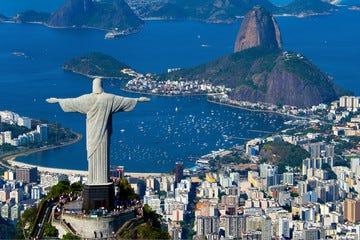Professors Amy De Farias and Sabino Luevano-Ortega took center stage at a Great Decisions series, spotlighting Latin America’s political challenges, cultural richness, and global relevance. They said that misconceptions about the region persist, especially in the eyes of many Americans.
De Farias, the History Department Chair, who spent years living in Brazil, discussed Brazil’s recent political unrest, particularly former President Jair Bolsonaro, who faces legal troubles for allegedly inciting a riot in the capital on January 8, 2023.
“People can’t get over that stereotype that it’s just a bunch of military people, that it’s corrupt, uneducated, chaotic,” she said. “But I was really trying to highlight how democratic societies like Brazil are making progress.”
On Chile, De Farias discussed the struggles of President Gabriel Boric, the country’s youngest-ever head of state. Despite his historic election, Boric’s approval ratings have plummeted amid economic challenges and social unrest, including protests over subway fare hikes and rape culture.
“Those students protesting over a subway—they know their rights and they’re protecting them,” she said. She contrasted this activism with what she sees as a rollback of personal freedoms in the U.S. “We’re letting the government take away a lot of our personal freedoms.”
Luevano-Ortega, Chair of the Spanish and Latin American Studies Department and a native of Mexico, provided historical context for Mexico’s political evolution, including the privatization wave of the late 20th century.
“The right wing essentially sold off everything in Mexico to private companies in the U.S. and Canada,” he said. “It killed the Mexican economy. They also fixed elections over the years and used propaganda through state-run TV stations.”
He emphasized that Mexico, and Latin America more broadly, is often misunderstood by Americans.
“Mexico is one of the most misunderstood countries from the U.S. perspective,” Luevano-Ortega said. “Latin America is like an onion. If you start to peel it off, you’re going to start to find the beautiful aspects of the culture, the literary tradition. The people are so welcoming.”
“In most Latin American countries, it’s free to go to the university—you just pay the fees,” said De Farias. “People think of that as their right. They really value education. Sometimes it’s just out of reach.”
Beyond politics, both professors wanted attendees to walk away with a more nuanced view of Latin America’s complexity and global importance.
“I just like to explore ideas with people,” said Luevano-Ortega. “It’s always joyful for me to talk about Latin America because that’s what I do—and I want to share info that people may not know, from someone who actually grew up there.”
De Farias echoed the sentiment: “I don’t think Latin America gets enough attention, so it’s my way of advertising how important the region is.”
In closing, Luevano-Ortega offered a vision of unity and mutual respect. “I would like to see the U.S. embrace the Latino part that it has. We admire Lincoln, we admire Martin Luther King, we admire the rule of law. We’re not a threat,” he said.


